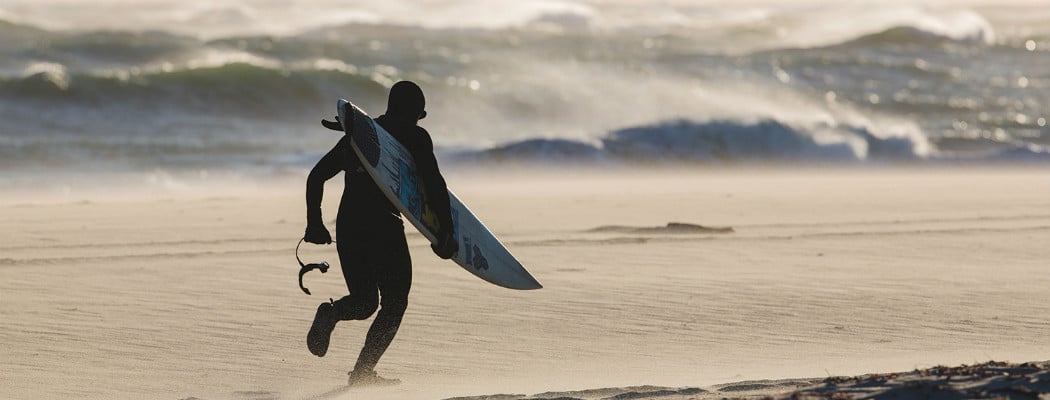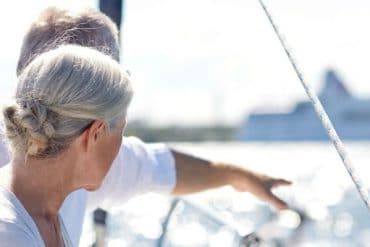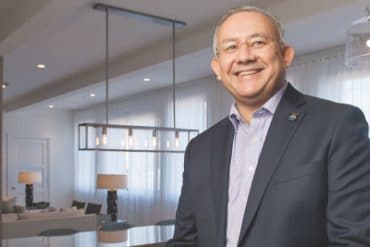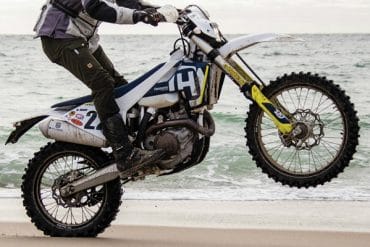The harshest waves local professional surfer Ryan Webb has encountered haven’t come by way of the ocean.
At just twenty-eight years old, Nantucket native Ryan Webb has already experienced what for some might be considered a lifetime of both tragedy and triumph. A full-time firefighter and paramedic, Webb reveals a rare tenacity and ability to transform hardship into the kind of inspiration that fuels achievement, growth and personal development.
 True to his Nantucket origins, Webb’s first love was the ocean. “I was possessed by the idea of becoming a professional surfer from a really young age,” he says. “It’s the persona that I adopted. It’s who I thought other people wanted me to be.” That persona was informed by a diverse childhood spent on Nantucket and in Costa Rica, as well as in Vermont, where he was mentored by a rabbi. His sense of independence, combined with a degree of natural discipline, eventually put him in league with a cohort of world-class surfers that traveled the world each year in search of the perfect wave. “I travel for big swells,” says Webb, who, like other surfing enthusiasts, has surfed big waves off the shores of such places as Ireland and Puerto Escondido and its famed Mexican Pipeline.
True to his Nantucket origins, Webb’s first love was the ocean. “I was possessed by the idea of becoming a professional surfer from a really young age,” he says. “It’s the persona that I adopted. It’s who I thought other people wanted me to be.” That persona was informed by a diverse childhood spent on Nantucket and in Costa Rica, as well as in Vermont, where he was mentored by a rabbi. His sense of independence, combined with a degree of natural discipline, eventually put him in league with a cohort of world-class surfers that traveled the world each year in search of the perfect wave. “I travel for big swells,” says Webb, who, like other surfing enthusiasts, has surfed big waves off the shores of such places as Ireland and Puerto Escondido and its famed Mexican Pipeline.
However, the surfing community ultimately didn’t fulfill Webb’s desire to connect in the most meaningful way. “I don’t know that I really like people who are just surfers all that much,” he says. “The ones I admired always had something else going on, like the ones who were ER physicians, or the guys who were also in the military. My older brother was in the special forces and he was an important influence.”
After graduating from Nantucket High School, Webb traded his wetsuit for fire-fighting gear. “I knew I needed to start helping other people,” he says. So in 2011 he became a volunteer firefighter on Nantucket, enrolled in paramedic school in Cambridge, and then served at the Falmouth Fire Department for three years. When Nantucket started hiring paramedics for the first time, Webb decided to move back home. “Nantucket was only at the EMT (emergency medical technician) level for a long time,” he explains. “Paramedics are licensed under a doctor to push multiple medications. As a paramedic, I can also do invasive procedures, advanced airway treatments and use specialized equipment.”
 As fate would have it, Webb would soon use those skills to try and save a life. Two years ago while surfing in Mexico, he learned that a man had a heart attack on top of a building that was under heavy construction. Without hesitation, Webb climbed up the scaffolding to come to the man’s rescue. “It was a nasty extrication from the top of the building, because I had to do CPR the whole way down,” he said. “It was a five-story building, and I had to climb the scaffolding barefoot. I wound up going back to the hospital with the patient in the ambulance, trying to revive him. The family showed up, and it was tragic, but at the same time it gave me a sense of purpose. I wasn’t just surfing. I was a part of what is actually going on in the world.”
As fate would have it, Webb would soon use those skills to try and save a life. Two years ago while surfing in Mexico, he learned that a man had a heart attack on top of a building that was under heavy construction. Without hesitation, Webb climbed up the scaffolding to come to the man’s rescue. “It was a nasty extrication from the top of the building, because I had to do CPR the whole way down,” he said. “It was a five-story building, and I had to climb the scaffolding barefoot. I wound up going back to the hospital with the patient in the ambulance, trying to revive him. The family showed up, and it was tragic, but at the same time it gave me a sense of purpose. I wasn’t just surfing. I was a part of what is actually going on in the world.”
Soon after the events in Mexico, in what seems like a bitter irony, while serving as a paramedic on the front lines of Nantucket’s opioid crisis, Webb lost two family members to complications involving addiction. “It struck a really deep chord in me,” he reflects. “The thing about substance abuse is that it’s not a villain you can see.” Even in the face of such deep loss, he felt compelled to further strengthen his path and purpose. “The empathy I now have towards a patient who is having a hard time, on multiple different levels, really helps me as a health-care provider.”
 In this sense, the mental and physical discipline of surfing, of embracing the immense and unpredictable power of the ocean, has prepared Webb for life as a paramedic. “Every morning when I get up, I read to center myself. The more sourced I am on a platform that has a doctrine of order, the more effective I am in a chaotic situation. The more squared away I am with my own mental and physical fitness, the more ready to go I am when there’s a big swell.” And as Ryan Webb has learned all too well over the years, the biggest swells can come when you least expect them.
In this sense, the mental and physical discipline of surfing, of embracing the immense and unpredictable power of the ocean, has prepared Webb for life as a paramedic. “Every morning when I get up, I read to center myself. The more sourced I am on a platform that has a doctrine of order, the more effective I am in a chaotic situation. The more squared away I am with my own mental and physical fitness, the more ready to go I am when there’s a big swell.” And as Ryan Webb has learned all too well over the years, the biggest swells can come when you least expect them.







